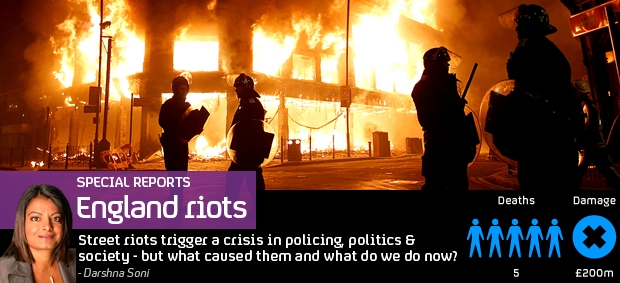Gang leaders’ arrests spark ‘chaos’
The arrests of more than 200 leaders of London street gangs in the wake of last year’s riots has led to an increase in “chaos, violence and anarchy” there, a report claims.
Prime Minister David Cameron promised an “all-out war on gangs and gang culture” following the riots which brought mayhem to many English cities in the summer of 2011, and police have responded by arresting many of those associated with criminal groups.
But the report, by the Centre for Social Justice (CSJ) think-tank, warned that the removal of the so-called “elders” from the streets has backfired by creating a power vacuum in which younger and more hot-headed members seized control of gangs on a wave of violence.
Drawing on interviews with community leaders and former gang members, it warned of an “escalation” of violence as more junior members – known as “youngers” – vie for status and respect in the absence of the restraining hand of older figures who had imposed a code of behaviour.
“There was a consensus that the current gangs neither have such a code nor cohesive leadership, which is resulting in increased chaos, violence and anarchy,” said the report by the CSJ, which was founded by Work and Pensions Secretary Iain Duncan Smith.
It also reported a “startling” increase in the number of girl gang members and a rise in sexual violence within gangs, citing one case in which a 13-year-old girl involved with a gang was being sexually exploited by members and was grooming her own 10-year-old sister for the same purpose.
‘Lord of the Flies’ environment
CSJ managing director Christian Guy said that the police crackdown after the riots had “created a Lord of the Flies environment in which anything goes”.
The surest way of eliminating gangs is to try to ensure that children and young people never want or feel the need to join them. Time to Wake Up report
He added: “Gangs played a significant role in the riots and it is dangerous to pretend otherwise – in London at least one in five of those convicted was a known to be part of a gang.
“The prime minister declared an all-out war on gang culture after the riots, which culminated in a radical strategy heavily influenced by the CSJ’s own gangs research.
“But one year on political commitment is waning and the government and local authorities have mistakenly assumed that its new strategy represents job done – it could not be more wrong.
“We have talked to members of our countrywide alliance of small, frontline organisations and charities asking them how they feel gang culture has changed in the light of the government response. Worryingly many have drawn us a picture of little or no progress.”
Database of most harmful gang members
In the wake of the riots, the Metropolitan Police created a centralised database of the most harmful gang members, and Operation Trident had its remit extended from gun crime to broader gun-related issues.
The report, entitled Time to Wake Up, welcomed the Met’s efforts, but said they need to be backed up by a broader government strategy emphasising the need to stop young people joining gangs in the first place.
“Many in Whitehall regard the riots as a random one-off, and mistake the quashing of the disorder as control of the streets,” it said.
“They could not be more wrong. The alarming fact is that many streets across the country are besieged by anarchy and violence. There is no control in such neighbourhoods.”
The CSJ report recommended “addressing the drivers of gang culture, not just the symptoms”, including a new multi-agency Whitehall task force to ensure that as much focus is put on prevention as on enforcement.
Stop next generation of gangs
It said: “The surest way of eliminating gangs is to try to ensure that children and young people never want or feel the need to join them. To do this we need to tackle deeper issues in our society and seek to nurture and support ever-strong families and stronger communities.”
A government spokesman said: “Our ‘ending gang and youth violence’ strategy makes clear this problem cannot be tackled through police enforcement alone.
“That’s why a £10m fund is helping to stop the next generation of gang members as well as targeting those already involved in violence.
“There’s also a new network of young people’s advocates to provide direct support to victims of gang-related sexual violence and we introduced gang injunctions for 14-17 year olds.
“There are no quick fixes but we are seeing results. The crime survey for England and Wales shows that crime is down by 6 per cent, and police figures show knife crime is down by 9 per cent.”
